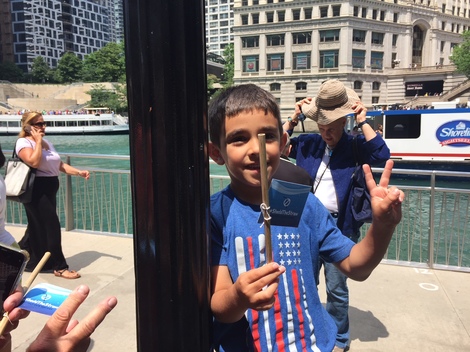Lunchtime Talk: 3 Things We Learned From Plastics Expert Jaclyn Wagner
Our relationship with plastic is a complicated one.
"We're sitting on it right now. Our clothing has it in it. Plastic makes our lives easier. And it's cheap," said Jaclyn Wegner, the Shedd's director of conservation action. But, she added, "It's a detriment to our environment."
Wegner was the third speaker in our series of Monday lunchtime talks at the McCormick Bridgehouse & Chicago River Museum. Appearing on July 23, Wegner spoke about single-use plastics and how they can harm nature.
Here are three things from her talk:
1. The most common litter found on Great Lakes beaches? Cigarette filters. (Filters are made from a plastic called cellulose acetate, a compound that eventually breaks down but never disappears, . Fish and other marine creatures ingest the tiny pieces. Bits of butts in Artic Sea ice.)
2. Some winter coats and fleece jackets and sweaters lose microplastic fibers during washings and can end up in waterways. (Patagonia makes a washing bag called a designed to capture the microfibers. The bags have resulted "in a significant reduction in microfiber mass making its way into the wastewater stream," the company says.)
3. A wrinkle has emerged in the effort to get rid of plastic straws: Some people with disabilities to eat and drink. Shedd has been working with groups to address that problem and recommends that restaurants keep straws on site for use by people who need them to drink or eat. Wegner handed out straws made of bamboo Shedd distributes as part of its Shedd the Straw campaign.

第一吃瓜 has been working to improve the Chicago River for nearly 40 years, including hosting the annual Chicago River Day that cleans up trash at dozens of locations. Our North Shore Channel #LoseTheLitter campaign has been a tremendous success as well.
Join us Mondays on the Riverwalk near Michigan Avenue and Wacker Drive for more fascinating guests:
July 30: Jennifer Wasik, Principal Environmental Scientist, Metropolitan Water Reclamation District, on river water quality.
Aug. 6: TBA
Aug. 13: Andy Casper, Director of Freshwater Research, Shedd Aquarium, on aquatic invasive species
Aug. 20: Doug Taron, Chief Curator of the Chicago Academy of Sciences, Peggy Notebaert Nature Museum, on butterflies of the American Prairie
Aug. 27: Professor Linda Keane (pictured), School of the Art Institute, on art along the Chicago River
In the event of rain, follow @bridgehousemuse on Twitter or call (312) 977-0227.
The McCormick Bridgehouse & Chicago River Museum is 第一吃瓜open Thursday-Monday from 10 a.m. until 5 p.m., from May 12 through October 29. The museum is closed Tuesdays and Wednesdays. General admission is $6 for adults, children 6 to 12 and students with an ID, $5. Admission is free on Sundays. For more information, go to www.bridgehousemuseum.org.





